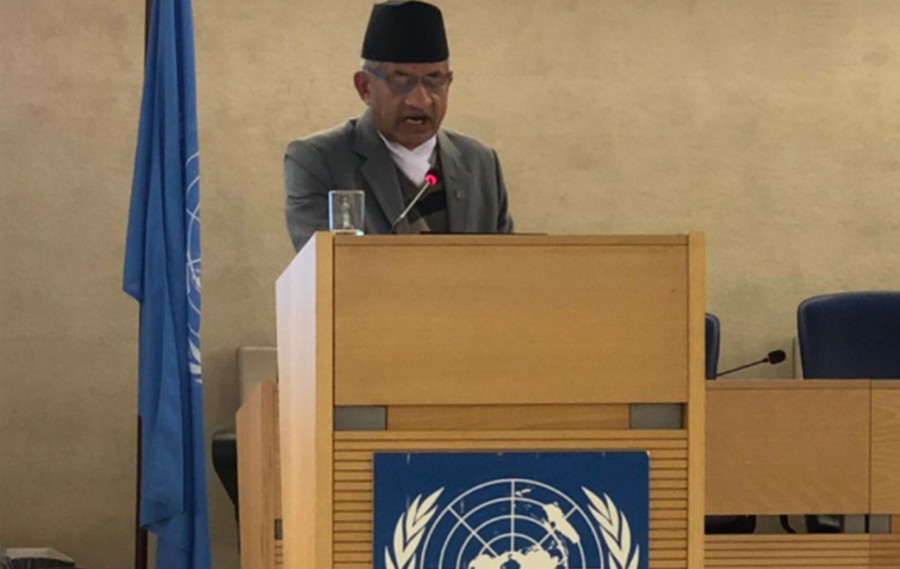National
No blanket amnesty for serious rights violations, Gyawali says in Geneva
Foreign Minister Pradeep Gyawali has reiterated that there will be no blanket amnesty in the cases of serious human rights violations committed during the decade-long Maoist “people’s war”.
Anil Giri
Foreign Minister Pradeep Gyawali has reiterated that there will be no blanket amnesty in the cases of serious human rights violations committed during the decade-long Maoist “people’s war”.
Addressing the 40th session of the United Nations Human Rights Council in Geneva on Thursday, Gyawali apprised the international community of Nepal’s ongoing transitional justice process and said that the Nepal government was preparing to amend the laws in consultation with, and participation of, the victims.
“There exists a requisite political will to conclude this last remaining task of the peace process,” said Gyawali. “In doing so, we will be guided by the Comprehensive Peace Accord, directive of the Supreme Court, relevant international commitments, concerns of the victims and the ground realities.”
The Supreme Court of Nepal in 2015 had struck down some provisions of the Transitional Justice Act-2014 and called for an amendment to the law. But the government is yet to amend the laws in line with the court verdict. Meanwhile, the international community and conflict victims have also raised their concerns about the government’s failure to introduce laws as per Nepal’s international obligations.
The government early this month extended the terms of the two commission—Truth and Reconciliation Commission and the Commission of Investigation on Enforced Disappeared Persons.
The foreign minister’s renewed commitment to concluding the remaining tasks of the peace process with no amnesty in cases of serious human rights violations comes at a time when some sections of the international community have voiced concerns about the lack of victims’ participation and laws required to guide the transitional justice process.
On January 25, nine foreign missions based in Kathmandu, at the initiative of the United Nations, asked the government to clarify its plans to take the transitional justice process forward and ensure broader consultation with the stakeholders.
“… We encourage the government to engage in broad-based, meaningful consultation with conflict victims, civil society and wider stakeholders that allows space and time to discuss and address issues raised before action is taken and helps shape a course of further action that reflects the will of the people,” the international community said. “Members of the international community are also united in the view that any solution should have the needs of victims at its heart. Only then can the peace process move forward on a strong foundation.”
But that did not go down well with the government, as Prime Minister KP Sharma Oli, who was in Davos, Switzerland, to participate in the World Economic Forum, said the “diplomatic community need not rally behind [Nepal’s] peace process; we are capable of handling it”.
In Geneva on Thursday, Gyawali termed the ongoing peace process “nationally owned and homegrown”.
“Nepal represents a uniquely successful case of democratic political transformation. At the centre of this process lies our aspiration to ensure equal rights to all of our people. Therefore, Nepal’s commitment to the universal values of human rights is total,” he said.
“We are a party to all major international human rights instruments, including seven of the nine core human rights conventions. We have internalised those values in our national laws, policies and practices.”




 20.12°C Kathmandu
20.12°C Kathmandu














